All Tarzan fans know that the jungle lord is a superb linguist. In his chronicles presented by Edgar Rice Burroughs, he is portrayed as a rapid learner and he can fluently speak several civilized languages, and scores of African dialects, and he learns the languages of several lost civilizations. In Tarzan Of The Apes, we learn that Tarzan's first spoken language is Mangani (the language of the apes). By the time Tarzan is eighteen he can write English fluently, but he does not learn to speak his first civilized language, French until he is twenty. Why then, if he was such an exceptional linguist, did he not learn the language of Mbonga's tribe?
Although spending many hours watching and studying the ways of the black men Tarzan was never really in a position to learn their language until the kidnapping of Tibo, the son of Momaya and Ibeto. Should not the ape-man have appropriated some knowledge of their language from this cannibal child? Tibo's experiences in Tarzan's life are told in "Tarzan And The Black Boy" and "The Witch-Doctor Seeks Vengeance", from the book Jungle Tales Of Tarzan.
The ten-year-old boy enters Tarzan's life shortly after Kala's death. The jungle lord is slightly over eighteen years old and it is during a very lonely phase of his life. Not only has Tarzan lost the only mother he has ever known, but he has also lost his first love, Teeka, to his childhood playmate and friend, Taug. By the time of Tibo's appearance his Manganni friend's firstborn, Gazan, has grown to the point that he is developing arboreal tendencies.
Edgar Rice Burroughs had the following to say about the little black boy who was to enter Tarzan's life. "Tibo, the little black boy, lacked the divine spark which had permitted Tarzan, the white boy, to benefit by his training in the ways of the fierce jungle. In imagination, he was wanting, and imagination is but another name for super-intelligence. Imagination it is which builds bridges, and cities, and empires. The beasts know it not, the blacks only a little, while to one in a hundred thousand of earth's dominant race, it is given as a gift from heaven that man may not perish from the earth." Jungle Tales Of Tarzan, chapter 5.
From this description, one can easily tell Tibo is only a simple-minded little native boy with no special learning capabilities. Tarzan is just the opposite. He is that one in a thousand that excels above normal men. Therefore, it would seem reasonable to assume that if a simple-minded little boy like Tibo could speak Mangani, Tarzan could have easily picked up Tibo's simple African dialect.
To shed a little light on this puzzling situation you need to know how much time the jungle lord spent with Tibo. Naturally, the more time they spent together the more opportunity each had to learn the other's language. The less time together, the least amount of time to learn the other's language. When one begins to investigate the two short stories, one quickly discovers that there are two descriptions to the tale. The first is Momaya's, Tibo's mother, which suggests that her son's abduction lasted only about a week. The second version is Tarzan's and we are told that the abduction lasted about one month.
Looking at Momaya's version. "Momaya, Tibo's mother, grief-stricken at the loss of her boy had consulted the tribal witch-doctor, but to no avail," ERB-Jungle Tales Of Tarzan. Rabba Kega's magic had failed to bring her son back on the first attempt, and she refused his bargain for a second try. Instead, she found where another more powerful witch doctor, Bukawi, lived.
Sneaking out of the village by night Momaya traveled north for several hours before being treed by a predator. She stayed there until the next day. When it was safe the desperate woman continued on her journey. "It was noon of the third day when Momaya came within sight of the cave of Bukawi, the unclean." ERB-Jungle Tales Of Tarzan. After haggling with the witch doctor for half an hour they reached an agreement and the anxious woman started back towards the village of Mbonga.
Once Tibo's mother was out of sight it occurred to Bukawai that he should have asked for a retaining fee just in case the woman should back out of the deal. Since she had no great head start the witch doctor decided to overtake her and make his new demand. Just as Bukawai caught sight of Momaya, Tarzan was rescuing her and Tibo from Numa, the lion. Tibo just happened to be in the same part of the jungle as his mother when the lion attacked. At this point, Tarzan gives up his desire to have his own balu and escorts mother and son back to the village. Momaya's story seems to have lasted approximately one week.
Now let's investigate Tarzan's description of Tibo's abduction. "During the week which followed (Tibo's abduction), Tarzan found his time much occupied." ERB-Jungle Tales Of Tarzan. None from his Mangani tribe would accept Tarzan's new balu, and all except Teeka would have killed him at the first opportunity. Because of this Tarzan took the child with him when he left the tribe to hunt.
After the first week among the anthropoids, the white giant finally did teach Tibo a few Mangani words. Even so, things were still not progressing as rapidly as Tarzan had hoped for. The black boy had lost his laugh and he became thinner every day from not eating.
Because of the never-ending rejection of Tibo by his Mangani family, Tarzan finally began to spend more and more time away from the tribe. "Little by little his absences from the tribe grew in length as he wandered farther away from them, until he found himself a greater distance to the north than he had ever before hunted, and with water and ample game and fruit, he felt not at all inclined to return to the tribe." ERB-Jungle Tales Of Tarzan.
As Tarzan and Tibo spent more time away from the Mangani, Tibo developed a better attitude. "He now trotted along behind Tarzan when the ape-man went upon the ground, and in the trees he even did his best to follow his mighty foster parent." ERB-Jungle Tales Of Tarzan. Still, the new balu continued to be sad and lonely, and his body continued to deteriorate drastically. One of the bright spots though was the rapid progress in the language of the Mangani. "Even now he and Tarzan could converse in a fairly satisfactory manner by supplementing the meager ape speech with signs." ERB-Jungle Tales Of Tarzan.
As the two hunted in this new northern territory Tarzan caught the scent of Bara, the deer. Hiding Tibo in a catch of a tree the jungle lord set out upon the hunt. During the absence of the white giant Momaya accidentally happened upon her son's place of concealment while returning from Bukawai's cave. Just as the two were united they were attacked by Numa, the lion. It is at this time that Tarzan returned and saved mother and son from Numa while Bukawai watched from his position of concealment.
It can easily be seen that there is no way the jungle lord's version could fit within the week of Moyama's version. In "The Witch-Doctor Seeks Vengeance" it is stated that Bukawi stole the native boy on the second Sun after the ape-man allowed the youth to return home. On the very afternoon of Tibo's abduction, the white giant arrives at the village where he hears Moyama crying loudly. Earlier this same day, just before Tarzan sets out for the village the author states, "It had been at least a moon since he had last been to Mbonga's village and played a trick." ERB-The Return Of Tarzan, The last recorded trick was the one that led to Tibo's abduction. From these passages, it indicates that Tibo was with Tarzan for approximately one month which does allow enough time for all the described events to occur.
In actuality, Moyama's description only covers the last days of Tibo's first abduction. Edgar Rice Burroughs more than likely omitted the details of informing the reader how many hours the warriors searched for Tibo before Rabba Kega was approached. Nothing is mentioned about the amount of time it took the witch doctor to work his magic or the amount of time he would have stalled when it failed. Moyama lived in a society where husbands could eat their wives if they got out of line. Under these circumstances it is most probable that it took a little time, even for a desperate mother, to work herself into such a frenzy that she would dare challenge the system in which she lived.
Using the time frame from Tarzan's version we can now look at the question of why Tarzan did not learn the language of Tibo's tribe. Tarzan figured that if he could get Tibo, his balu, to learn the language of the Mangani, and become a good hunter and mighty fighter, then the tribe of Kerchak would be willing to accept him. So the ape-man proceeded to do just that.
One must understand that it was Tarzan's main objective to teach Tibo, Mangani, and not for himself to learn the language of the black men. It is true that Tarzan could have learned the Gomangani language much faster, but outside of their own communication, this would solve little. The jungle lord's sole aim was to get Tibo accepted into the tribe of Kerchak.
We have now determined Tibo was being taught ape talk from day one. Tarzan is only subjected to the native boy's language from his casual babbling. Despite this concentration on ape talk, Tarzan did indeed learn from his foster son, and much of it he probably didn't even realize.
The original ape language is very limited and very few words describe anything about man. Knowing Tarzan's desire to learn, especially about man, there is no doubt that many of Tarzan's questions were about his own species. Although the black boy became fairly fluent in Mangani, many times he still found himself wordless because there were no ape words to describe the point he was trying to make. Therefore, he had to substitute words from his own tongue to give an accurate description.
Through this process, Tarzan did learn a few Gomangani words, but not sentences. When Tibo taught a word to his foster father he pronounced it slowly and clearly as any teacher of a foreign language would. By the end of the black boy's stay, Tarzan could recognize and understand some Gomangani words if they were spoken slowly, clearly, and singular. He did not reach a point where he could recognize a known word if it was spoken rapidly and in a sentence of any length. In this manner, Tarzan did indeed learn much of the black man's language, but not nearly enough to speak or understand a conversation.
 |
| Jungle Tales Of Tarzan |
It is also important to mention that the ape talk Tibo is speaking is not Mangani in its true form. There were many Mangani words Tarzan could not say correctly because the human throat was not capable of producing the sounds needed. Edgar Rice Burroughs does not openly say it, but from evidence, in several passages, the ape man's speech sounded to the Mangani much like the speech of a person with a speech impediment would sound to us.
Thus you have Tarzan teaching Tibo a sort of retarded form of Mangani. It is also very improbable that a dull native child could master the barking-growling language even to the jungle lord's perfection in a month's time. In reality, we have Tarzan's retarded Mangani mixed with signs, and Tibo's inexperienced Mangani, plus a very limited amount of Tibo's native dialect. Although Tarzan and Tibo reached a point where they could communicate quite fluently, it is very improbable that Tibo could converse with the other apes of Kerchak's tribe. In fact, nowhere in Jungle Tales Of Tarzan does Tibo do so.
ABOUT THE AUTHOR
James Michael Moody is a lifelong fan and collector of Edger Rice Burroughs. Over the past forty-five years, Moody has contributed over two hundred articles to various ERB-related fanzines. He also manages an unauthorized Tarzan blog titled Greystoke Chronologist: James Michael Moody. There, the researcher chronologies the Tarzan books starting in May 1872 (known as the pushback theory) instead of the more accepted date, May 1888.
James Michael Moody also authorizes the action-packed Sci-Fi fantasy adventure Unium series. Pioneers On Unium, published December 31, 2019, Exiled On Unium, published August 25, 2022, and Swordsman On Unium, published on July 15, 2024.









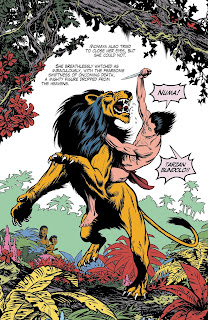
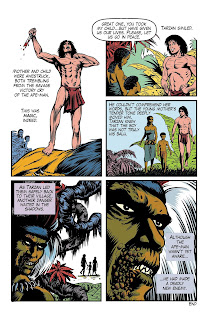


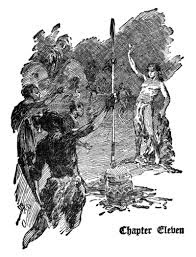



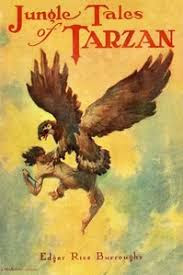
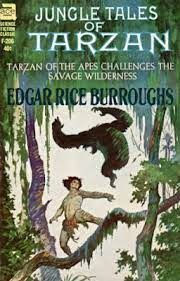
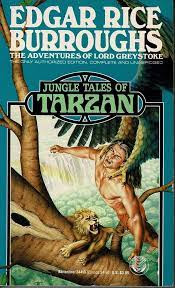


No comments:
Post a Comment